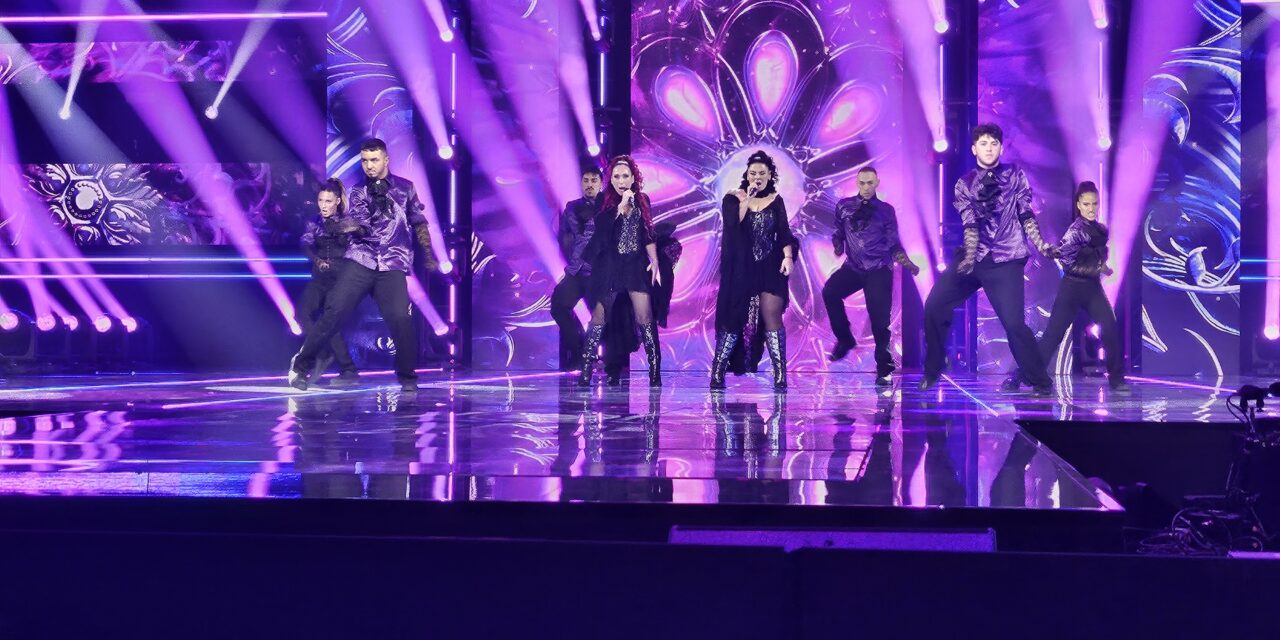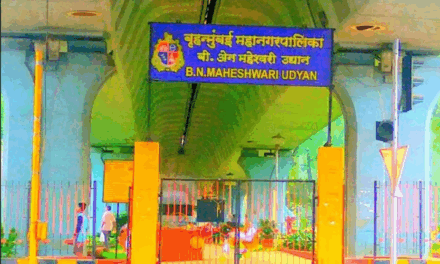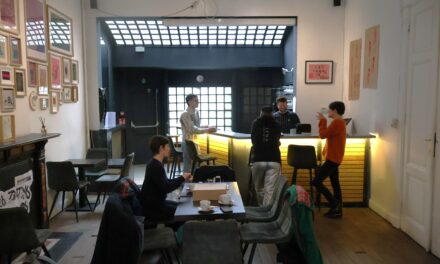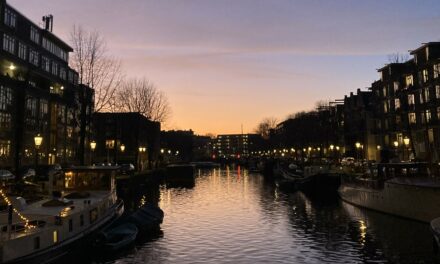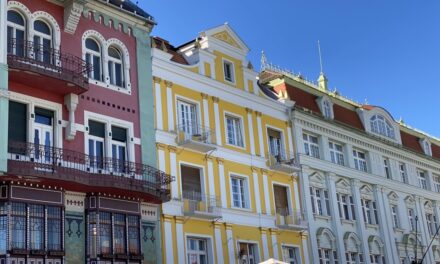For each issue of queer.lu, we dispatch our travel columnist Alex Raßbach to diverse events around the country, so you can follow his adventures and explore the hotspots for LGBTIQ+ people in Luxembourg. This time, he is accompanied by his friend Clara Schreck, a fellow member of the Uni.lu LGBT+ Association.
Picture this: it’s the 27th of January 2024, and it’s a sunny, typical afternoon in the middle of exam season. But amidst all the stress and chaos, something remarkable is happening – Luxembourg is making a triumphant return to the Eurovision Song Contest (ESC) after a 30-year hiatus! And guess who was lucky enough to witness this historic moment first-hand? Yours truly, the cliché gay, accompanied by my good friend Clara. Armed with a press badge and full of excitement, we embarked on a wild ride full of unforgettable experiences that we’ll cherish forever. Come along as we dive into the crazy world that was the Luxembourgish ESC song selection!
If you’re not familiar with the ESC, let me tell you – it’s a huge deal! Every year, countries from across Europe (and even Australia, believe it or not) come together to compete in a song contest that’s been celebrating European diversity since 1956. From its humble beginnings with a live orchestra, the ESC has evolved into a massive show with wild costumes, time-honoured traditions, and of course, plenty of public and jury votes. Some of today’s biggest names in music got catapulted to stardom on the ESC stage, including Céline Dion and ABBA, who took home the crown in 1988 and 1974, respectively. Sweden has a particular history with the ESC, having won it seven times. Luxembourg isn’t too shabby either, with five wins, and, in our humble opinion it has a good chance for a sixth one this year, but from the top:
This year’s eight candidates potentially representing Luxembourg can be grouped into two main categories: The rock-pop-bobs and the ballads:
The first category includes: “Believer”, “Finally Alive”, “Drop”, “Devil in the Detail”, “Hold on”, and “Fighter”. While “Believer” and “Hold on” can be considered vocally good songs, they were, what we thought of as radio songs. Nice lyrics, joyful melody, but a little something was missing, the little bit of spice that makes a normal song a Eurovision song. This was where the other four songs delivered, each in their own way. Edsun transported us into a synthesized dance frenzy, One Last Time showed us the good side of the Devil, making our heads bang to the rhythm of the stage flames, Angy and Rafaela gave off real girl-boss vibes, affirming my friend Clara in her amazing mindset, and Tali made my linguistic heart beat faster with her bilingual approach.
The two remaining ballads, “Paumée sur Terre” and “Drowning in the Rain” were everything you’d expect and more. Vocally, both songs were masterpieces; beautiful high notes, full of emotions, paired with a breath-taking stage presence. I remember both Clara and me getting goosebumps as soon as hearing those ballads. Textually, they both dealt with raw topics, the questioning of one’s life as it is as well as its hardships – quite the contrast to the otherwise so colourful and joyful Eurovision.
Nonetheless, in the end, Tali Golergant fought her way through and won the selection. Clara and I were thrilled with this result, jumping up and down in the Press Room, as soon as it was announced. Because, yes, you heard that right, we were part of the Press: This made the whole experience radically different because we didn’t only see the final show, but also the dress rehearsal:
So, what does a dress rehearsal actually consist of? All the people involved in the show, including artists and technical crew, do a run-through of it all at an accelerated speed to make sure everything will go to plan. Timing, outfits, music, everything must be on time and go according to plan. A live transmission does not allow for any mistakes, and this is the last check before the show. Suffice it to say, the stress is high as the artists prepare themselves for the competition and as the technical crew finishes setting up everything. It is 2 pm, they all have 6 hours left before it all starts.
As we entered the concert room, we were surprised at how empty it felt without the crowd. Only a few spectators were there, along with the sound engineers, cameramen and the press in front of the stage, already taking pictures. But as the artists came in, we realized how perfect this was for us as it allowed us to access the front of the stage very easily. So close, in fact, that we could feel the burn of the flames during the songs. It was so intense that other journalists had to turn away and protect their cameras – but we did not, we faced it all and took all this amazing opportunity in.
This was all overviewed by a woman we couldn’t see, probably behind the scenes. She was the real girl boss there. Anything out of line or outside of timing limits? She would stop the whole thing and make the artists start over. There was no time for chitchat or pleasantries, the show would begin a few hours later and every detail had to be fine-tuned (pun intended). Meanwhile, we were fascinated by the giant crane used to support the travel camera, or the cameramen with their stabilization system going on and off the stage to get the best angle during the performances. Imagine wearing an exoskeleton kind of suit from which your camera and stabilizing system are attached. Now you must quickly go up and down the stairs to access the stage and walk around the artists as fast and swiftly as possible. They were so focused on what they were filming that a second person always had to follow them and hold them while moving to make sure they wouldn’t trip or fall off the stage.
The funniest part was the rehearsal of the presenters. They weren’t quite fully ready and some of them didn’t have their full costumes on. Actually, one of them still had her curlers in her hair! They were acting so happy and enthusiastic, in front of… 20 people in an empty concert hall. There wasn’t much room for improvisation, and they were following the words displayed on the teleprompter behind us. Again, no time for delays, but it was quite amusing to turn around and read the very words the presenters were saying. We took pictures and tried recording some of the artists, but this was quickly shut down by the staff members. They couldn’t afford to have the press leak videos of the performances before the show. All journalists were required to wait until 10 pm, the end of the show, to start publishing their articles. After all, we could risk giving spoilers and influencing the votes of the public.
After the end of the run-through, we went back to the “press room”, a space dedicated to all press guests. The back was reserved for the future winner’s press interview after the show. In front of it, multiple rows of tables and chairs for us to work and see the retransmission of the show on one of the many TVs hanging on the walls. The dress rehearsal had just finished, but this place was already buzzing from all the energy of the journalists. All of them had their computer out, editing all the rushes taken earlier to prepare for the 10 p.m. limit of broadcasting rights. They all had free access to snacks and drinks for a well-deserved energy boost. This was my first time witnessing the behind-the-scenes of such a TV event and I felt like I was in the middle of a beehive chasing after the latest news and the best coverage.
After enjoying the live show with a chocolate muffin in hand, we rushed to feel the pulse of the crowd, right after the curtain call, and let me tell you, it was electric. During our interviews, we discovered that the majority of the audience were rooting for Tali’s “Fighter”. But that’s not all – the multiculturality and multifacetedness of Eurovision was truly on display. We met a couple from Brazil who had been watching the ESC since 2015 and were overjoyed to see the show live. We also spoke to a person doing her PhD in Eurovision and Politics. It was a truly unique experience that you don’t see every day!
However, as the existence of such a PhD proofs, one can’t forget the political side of Eurovision. At the Luxembourgish song contest, there was a call for support for Ukrainian resistance against the Russian invasion, and also a Waterloo medley, highlighting that this year’s hosting gig by Sweden interestingly coincides with ABBA’s win turning 50. We can see this political stance also in the recent past, most explicitly, when Russia was not allowed to participate in the Eurovision Song Contest after its invasion of Ukraine in 2022.
Even though we really enjoyed the show, we cannot ignore that the event production was headed by Isreali TV producer Tali Eshkoli and her Isreali team and the involvement of the the Isreali media company Avoxvision. Tali Eshkoli organized the Eurovision Song Context in Tel Aviv in 2019. As the conflict between Israel and Hamas is continuing and a court case againt the Isreali government due to claims of genocide is ongoing, this Israeli involvement in our national contest has risen difficult feelings. There was even a protest organized by the national Boycott, Divestment, Sanctions (BDS) movement, calling for the boycott of Israeli involvement on all levels. While this Israeli involvement in the current times needs to be acknowledged and discussed, we still believe that the national contest allowed Luxembourgish artists to showcase their artistry on a new and bigger stage. The contest allowed Luxembourg to celebrate its local talent.
This sentiment was what fuelled Edsun during his performance. In our interview he said that he was proud to stay true to himself, sporting a glittery-red outfit, and to produce his song in collaboration with other Luxembourgish artists. He has one clear piece of advice to aspiring artists: “First of all, start. Then, carry on, don’t stop”. It brings so much joy and amazing opportunities that the marathon of songwriting, albeit sometimes scary and long, is totally worth it.
Amidst all the frenzy and commotion, we managed to get access to the after party and boy, did we make the most of it! Sipping on some chilled champagne, we navigated our way through the lively crowd, with our cameras at the ready to capture all the thrilling selfies – and we succeeded gloriously. While Clara had her fangirl moment in the arms of Angy and Rafaela, I was on Cloud Nine when I got complimented by the living legend Alexander Rybak. Slowly but surely, our social batteries were discharging. The annoying up and down with the elevator didn’t help with that. We needed the elevator for wheelchair access, but it was only usable with a key – which we didn’t have and had to ask for every time. That’s why, around 1am, we decided to call it a night. Full of new impressions, catchy songs for days and adrenaline, we wandered towards our nearby home, constantly thinking about one of Edsun’s sentences: “Listen to my song and it will change your life!” And we believe that this is exactly what it has done to us and will do to you, too, if you let yourself go with the Eurovision flow.

